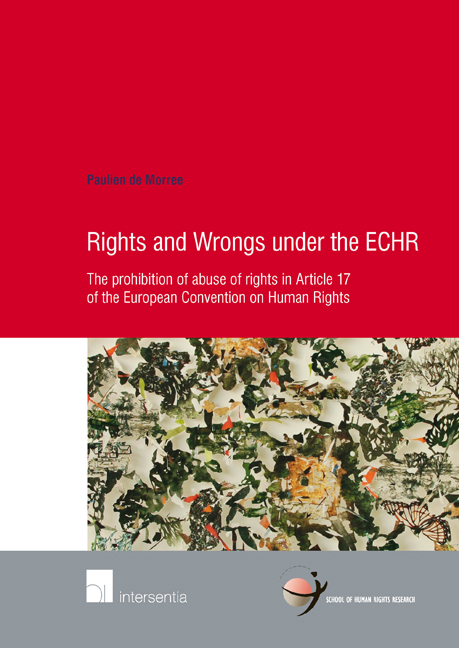 Rights and Wrongs under the ECHR
Rights and Wrongs under the ECHR Book contents
- Frontmatter
- Acknowledgements
- Contents
- List of Abbreviations
- Chapter 1 Introduction
- Chapter 2 The Creation of the European Convention on Human Rights
- Chapter 3 The Strasbourg Case Law on Article 17 ECHR
- Chapter 4 The Interpretation of Article 17 Echr in Legal Doctrine
- Chapter 5 Other Abuse Clauses in Human Rights Law
- Chapter 6 The Concept of Abuse of Rights
- Chapter 7 The Concept of Militant Democracy
- Chapter 8 The German ‘Wehrhafte Demokratie’
- Chapter 9 Militant Democracy in the Context of the ECHR
- Chapter 10 Conclusions
- Bibliography
- Table of Cases
- Samenvatting
- Curriculum Vitae
- School of Human Rights Research Series
Chapter 7 - The Concept of Militant Democracy
Published online by Cambridge University Press: 12 December 2017
- Frontmatter
- Acknowledgements
- Contents
- List of Abbreviations
- Chapter 1 Introduction
- Chapter 2 The Creation of the European Convention on Human Rights
- Chapter 3 The Strasbourg Case Law on Article 17 ECHR
- Chapter 4 The Interpretation of Article 17 Echr in Legal Doctrine
- Chapter 5 Other Abuse Clauses in Human Rights Law
- Chapter 6 The Concept of Abuse of Rights
- Chapter 7 The Concept of Militant Democracy
- Chapter 8 The German ‘Wehrhafte Demokratie’
- Chapter 9 Militant Democracy in the Context of the ECHR
- Chapter 10 Conclusions
- Bibliography
- Table of Cases
- Samenvatting
- Curriculum Vitae
- School of Human Rights Research Series
Summary
INTRODUCTION
In the previous chapter we have learned that the prohibition of abuse of rights in human rights law takes a distinct form, namely as an attempt to destroy the democratic system, and its values and principles. The purpose of the abuse clause is a very fundamental one, as its central concern ‘is not the impact on others but on the democratic regime as such’. These abuse clauses in the different international and regional human rights instruments (with the exception of the ACHR), like Article 17 ECHR aim to prevent groups and individuals from relying on human rights for the purpose of engaging in activities aimed at the destruction of these rights. Abuse in this context is not based on the rights of others, which is the main focus of the abuse of rights in general, ‘but on the democratic regime as such, which is endangered by the improper use of fundamental human rights’, as Sajó puts it. In other words, the abuse clause in human rights law reflects concern for the defence of democracy and fundamental rights, and precludes actions which undermine these principles. The legal strife against anti-democratic actors aiming to destroy democracy is the principal focus of the concept of militant democracy. To better understand Article 17 ECHR, it is therefore important to learn more about the interpretation and implications of the concept of militant democracy.
This chapter is the first of three chapters that focus on the concept of militant democracy. It examines the concept of militant democracy from a theoretical perspective. The following two chapters will subsequently explore the implementation of this concept in a concrete legal context. Chapter eight discusses the interpretation of the concept in the German constitutional order and Chapter nine explores how the concept takes shape in the context of the ECHR (in particular with regard to the interpretation of Article 17 ECHR). In what follows, we will start by examining the historical background of the concept of militant democracy. This chapter then moves on to the theoretical foundations of the concept. Subsequently, it explores how the concept of militant democracy has been put into practice in European democracies after the Second World War and how the implementation of the concept has been perceived in legal doctrine. Finally it reflects on the criticism that has been voiced with regard to the application of the concept of militant democracy.
- Type
- Chapter
- Information
- Rights and Wrongs under the ECHRThe prohibition of abuse of rights in Article 17 of the European Convention on Human Rights, pp. 147 - 184Publisher: IntersentiaPrint publication year: 2016


